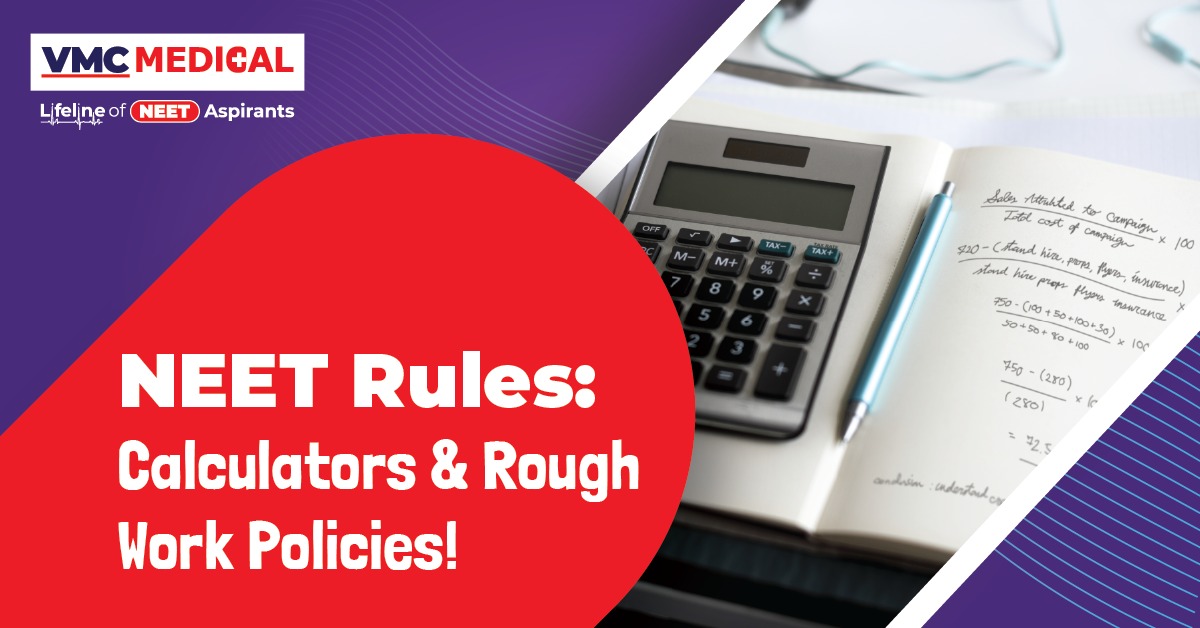NEET Exam Rules: Calculators and Rough Work Policies!
 Posted On
Posted On
8 total views, 8 views today
The NEET, or National Eligibility cum Entrance Test, is one of the most competitive and high-stakes examinations in India, determining admissions for undergraduate medical programs. With strict rules and regulations, many aspirants are left wondering what is permissible during the exam. One common query relates to the use of calculators or even rough sheets. In this blog, we take a step-by-step approach into understanding what is permissible and provide an exhaustive guide helping you navigate through the rules so that you may optimize your preparation and performance at the same time.
Understanding NEET’s Strict Examination Rules
NEET is conducted by the National Testing Agency (NTA), known for its rigorous standards to maintain a fair and secure testing environment. What with the restrictions on items as simple as calculators and even rough sheets from being taken inside, it’s a way of keeping malpractices at bay and providing level playing fields for all candidates. Here’s what you should know:
Can Calculators Be Used in NEET?
No, neither basic nor scientific calculators are permitted in an NEET hall. Students should solve all numerical type questions solely depending on mental calculations and by using hand-written methods. This ensures that there is fair competition with no one gaining an unfair advantage by using calculators or other technological devices.
Rough sheets allowed?
Similarly, hand written sheets are not allowed during the exams. But NEET question booklet specifically provides the candidate with blank space to write their calculations. Therefore, candidates have enough area for doing the calculations without bringing their own sheets.
Implication of the Rules for Candidates
The ban on calculators and rough sheets calls for a change in preparation strategy by the candidates. The ability to make rapid calculations, improve mental math, and learn to take effective notes will contribute substantially to getting through the exam smoothly.
Preparation Without a Calculator
Several NEET questions in the Physics and Chemistry sections will have heavy computation. As there is a ban on calculators, here are a few tips to enhance your computation skill:
1. Mentally Calculate
• Practice the basic arithmetic operations of addition and subtraction on paper, without the aid of a calculator
• Perform mental math using estimation and rounding to make calculations easier
2. Memorize Important Formulas
• Develop a formula sheet for easy reference during study hours.
• Practice solving various problems using formulas constantly.
3. Apply Vedic Math Techniques
• Learn shortcuts for multiplication, division, and squaring
• Look for online resources or books about Vedic Mathematics to improve your ability to calculate with speed.
4. Practice Under Exam Conditions
• Do not use calculators while attempting mock tests.
• Use the blank space in your practice material to make rough work similar to that of the actual exam.
Rough Work: Maximizing Use of Space
The small space allocated in the NEET question booklet for rough work demands organization to prevent confusion while attempting the questions. Here are a few tips:
1. Plan Your Work
• Divide the available blank space into different sections for the different questions.
• Use plain, brief writing to reduce messiness.
2. Emphasize Clarity
• Write clearly and do not overcrowd since a cramped script can easily produce mistakes in calculations.
• Use symbols and abbreviations to help save space and time.
3. Master Compact Note-taking
• Develop the habit of writing compactly but still making sure your rough work is readable.
• Practice writing down only the required steps for calculations.
It is very challenging to face numerical problems without a calculator or another additional rough sheet. Here’s how you can deal with these problems:
1. Time Management
Avoid spending too much time on numerical problems so that you can complete all sections of the exam. If possible, skip certain lengthy calculations and go back to them afterwards.
2. Remain Cool under Fire
Don’t panic if a particular calculation looks too long or involved to do so in time.
• Breathe, divide the problem into manageable steps, and solve methodically.
3. Do Not Overwrite
• Minimize or avoid overwriting/overstrike.
• Start fresh in a new part of the blank space to maintain clarity.
Benefits of NEET’s Prohibitive Rules
Despite the seeming unfairness of these restrictions, it helps even the playing field for each contestant. Here are the benefits of these rules:
1. Fair Opportunity
•Prohibition of calculators and other helps in NEET makes the competition level balanced between candidates from the different backgrounds and educational and financial background.
2. Better Mathematical Solutions
•The candidates learn to be keener in analysis and to calculate mentally without calculators and manual calculations.
3. Lower Dependence on Technology
•Being deprived of calculators builds up confidence while solving complicated problems on their own.
Take-Aways for Aspirants
To ace NEET, it is important to learn and thrive on its regulations. Here is a rapid summary of tips to prepare well:
• Improve mental calculations and problem-solving skills
• Make appropriate use of the blank spaces in the question paper for doing rote work.
• Practice during simulated conditions to build confidence.
• Plan and manage time as well as space in the best possible way in the examination.
.
Conclusion
Calculator and rough sheet rules in the NEET examination ensure fairness and integrity. It is a challenge, but it also challenges the candidate to achieve higher and study more rigorously. If you have built up your techniques systematically and adapted them to these constraints, then you can sit down confidently at the exam and do your best.
Remember, every limitation has got its door to opportunity to prove your skills. Follow these rules to become a part of the chosen field, the medical one. Good luck!



